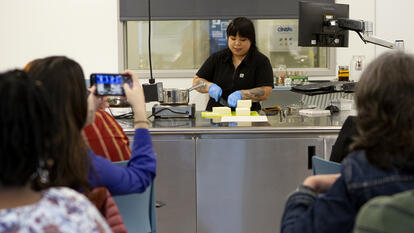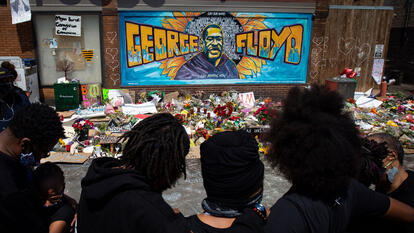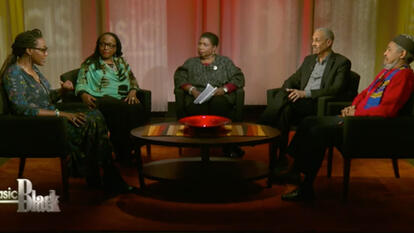The Freedom Project at Wellesley Kicks Off Its Inaugural Censorship Awareness Week

The Freedom Project at Wellesley kicks off its inaugural Censorship Awareness Week today, March 6, with “Freezing Speech: Global Trends in Censorship,” a presentation by Jodie Ginsberg, chief executive of Index on Censorship, a U.K.-based organization that promotes freedom of expression and campaigns against censorship worldwide. Her talk will be followed by “Censorship and the Prevention of the Mind,” by Thomas Cushman, director of the Freedom Project, Deffenbaugh de Hoyos Carlson Professor in the Social Sciences, and professor of sociology.
“Censorship, especially when backed up by state power, is a form of ‘mind killing,’” said Cushman in an interview. “Through restricting speech, censors inhibit the development of our minds and selves and keep us from realizing ourselves with other human beings through free expression. Students need to be aware that in a free society, freedom of expression is perhaps the foundational human right of our society. That’s why it comes first in the Bill of Rights.”
Censorship Awareness Week presentations continue March 7 at 4:30 pm with “The Censorial Impulse on Campus,” a lecture by Catherine Ross, professor of law at the George Washington University Law School, and March 8 at 4:30 pm with “Sexual Paranoia Comes To Campus (Intellectual Freedom Takes a Curtain Call),” by Laura Kipnis, cultural critic and professor at Northwestern University, where she teaches filmmaking. Both talks will be held in the Margaret Clapp Library Lecture Room.
The keynote address, “Censorship and Self-Censorship (What’s the Difference and Which Presents the Gravest Threat to Freedom of Speech?),” will be March 9 at 7 pm in the Alumnae Hall Ballroom. The speaker is Flemming Rose, a Danish journalist, author, and senior fellow at the Cato Institute in Washington, D.C. He was the editor of the Danish newspaper Jyllands Posten when it published cartoons representing the Prophet Muhammad, igniting an international debate about censorship versus the right to freedom of expression.
“We are trying to offer a broad range of speakers who address different aspects of censorship,” said Cushman. “I see censorship as a primary form of anti-intellectualism; others will discuss censorship in high schools and universities, and our keynote speaker will discuss his experience with violence for publishing controversial material in Denmark. The common thread is that censorship is the enemy of an open society.”
The Freedom Project was founded in 2013 to promote tolerance, intellectual diversity, and freedom of expression by presenting a wide variety of topics and political viewpoints. It was recently featured in a story by WGBH. “We look around campus, and if a conversation isn’t happening here that we think is important nationally or among academics elsewhere, we try to bring those people in,” Joshua McCabe, associate director of the Freedom Project, told WGBH. “We’re thinking big ideas, so they’re detached from what’s going on in the political arena, which I think is really good because four years from now Trump might be gone but we’re talking about those big ideas the whole time.”
In addition to its speaker series, the Freedom Project also selects 15 to 20 students each year to be Adam Smith Fellows. Fellows run biweekly seminars on readings of their choice and attend a weeklong Wintersession seminar on the topic of freedom in theory and practice. They also have the chance to work on original research projects and present their findings at Wellesley’s annual Ruhlman Conference in the spring and at professional conferences on and off campus. The Freedom Project also sponsors a wide variety of internships for Wellesley students around the world.
Sophia Leung ’19 is one of the 2016–2017 fellows. (See the full list below.) Leung told WGBH that the Freedom Project has expanded her understanding of political and world views that differ from her own. “I’m getting new perspectives,” she said, by hearing scholars from different parts of the spectrum and discussions where people are “comfortable with expressing what really is on their minds.”
Cushman is pleased to hear such remarks; he believes people learn and grow by seeking out and engaging ideas that might make them uncomfortable. “We can remain in little bubbles and echo chambers, or learn about how others see and interpret the world,” he said. “The latter strikes me as one of the foundations of liberal arts education.”
The Freedom Project’s 2016–2017 Adam Smith fellows are: Cassandra Allen ’18; Ellie Chalphin ’19; Samantha Churchill ’20; Madelena Collins ’18; Cassandra Cronin ’19; Jeane-Yve Daniel ’17; Caroline George ’19; Hannah Jacobs ’19; Sophia Leung ’19; Sabrina Liang ’19; Mary Meisenzahl ’19; Danni Ondraskova ’18; Samantha Ostenso ’19; Ninan Pollack ’20; and Kaila Webb ’20.



